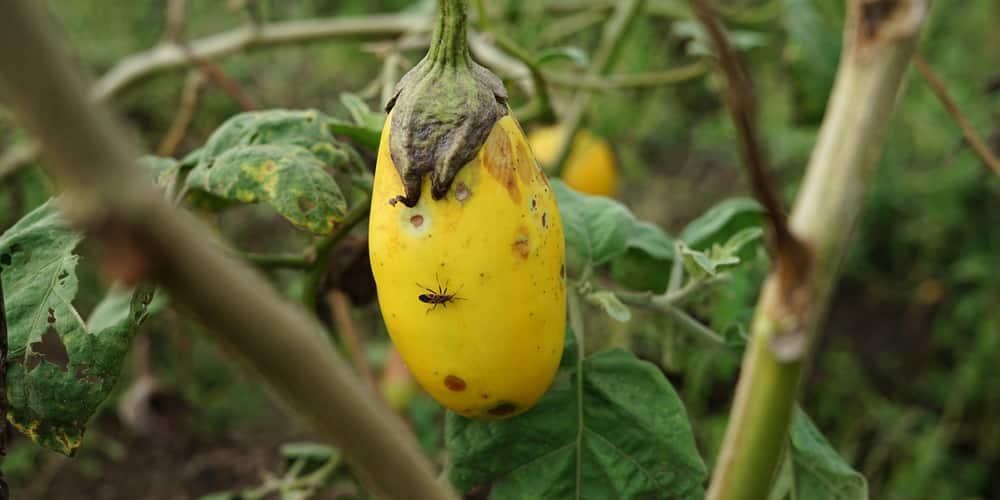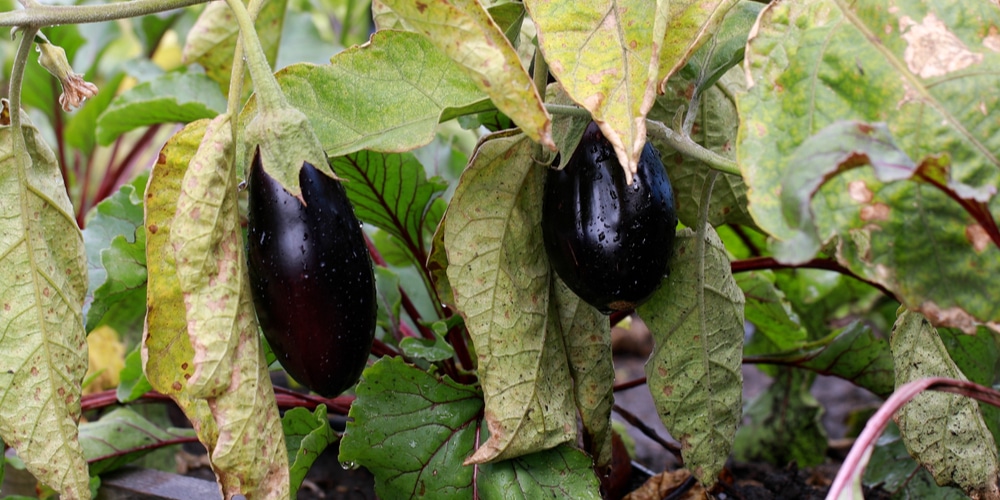Are you tired of going to the supermarket and paying for overpriced (and tasteless) veggies? Well, there is a solution! Indeed, you can grow your favorite vegetables in your garden (or even balcony!). Of course, it takes time and effort. And it is not for everybody. However, when you master the procedure, you’ll get plenty of crops.
Mind you: we are not saying that having a vegetable garden is an easy task. All we are claiming is that it is possible to grow eggplants and other crops from the comfort of your home.
Of course, things are not always what you wish. They can go wrong, even if you don’t want them to. When plants are not doing what they should, it is a way for them to “tell” you that something is off. If you want to know what it means when eggplants turn yellow and what you can do to revert the situation, keep reading!
Indeed, here we collected all the information you should know to grow healthy-looking (and tasty) eggplants!
Eggplants Turning Yellow: What Does It Mean?
Eggplants aren’t the easiest plant to grow. They need a specific climate and special growing conditions to thrive. Additionally, they are often the prey of insects that can ruin your plants in little time. But when you put all your efforts into recreating the ideal situation for these veggies to get yellow fruits, we understand you might feel down.
But don’t worry, we are here to help! You might be happy to learn that most of the time, having eggplants turning yellow shouldn’t be a cause for concern. Indeed, most eggplant species will turn yellow as they mature. Some varieties are naturally yellow (instead of purple), so things shouldn’t worry you in those cases.
But here is a list of reasons for your eggplants to turn yellow.
Your Fruits are Too Mature
You might be familiar with purple to blackish eggplants. And that’s the color of unripe eggplants. Even the seeds in those fruits aren’t mature. But if you leave your crops longer on the plant, they will turn yellow/brown.
The problem with eating overly ripened eggplants is that they usually taste bitter and have a tough texture. So, never wait for them to become yellow before eating them!
You Have Planted A Yellow Variety
Another reason your eggplants might be yellow is the variety you planted in your yard. Indeed, not all eggplants are purple. Some are white, and others are yellow (or even orange). Ensure you know which one you planted in your garden to avoid worrying about something that shouldn’t concern you.
Eggplant’s Leaves Turning Yellow
Instead, the plant’s leaves turning yellow may be a cause of concern (but still reversible in most cases). That is often the sign of disease, pests, or lack of nutrients.
To get rid of the egg plant wilting and discoloring issues, you must first identify its root cause. So, jump to the following sections to familiarize yourself with some of the problems that might raise this issue.
Attacks from Pests
Many pests will attack your eggplant. But spider mites and aphids will cause more severe problems with your crop. If you notice tiny spots on your plant’s leaves, spider mites might have attacked it. Ensure you take prompt action to reduce the damage. Otherwise, leaves will yellow and eventually fall off.
Aphids are visible to the naked eye and will suck out sap from your plant’s leaves, which might result in yellowing. Remember to choose organic pesticides on your eggplants to avoid issues when eating your crops.
Nutrient Deficiency
Alternatively, your eggplant might show discoloration due to a nutrient deficiency. One of the most common ones is inadequate amounts of nitrogen. Consider doing a soil test before amending it: you may find that other elements (such as magnesium) are missing too!
If you decide to apply fertilizer, remember to follow the instructions you find on the product label. Avoid overdoing it as you might stress your plant and cause more harm than good.
Diseases
Alternatively, your plant might be suffering from a disease. Blight is common in eggplants and, when severe, it might cause your crops’ leaves to turn yellow. Unfortunately, there aren’t solutions to this problem. You will have to remove and discard any affected plants to minimize the spread of these diseases in your garden.
Still, you can use preventive measures to reduce the impact of this problem. Consider rotating your crops every couple of years and protect them from low temperatures.


